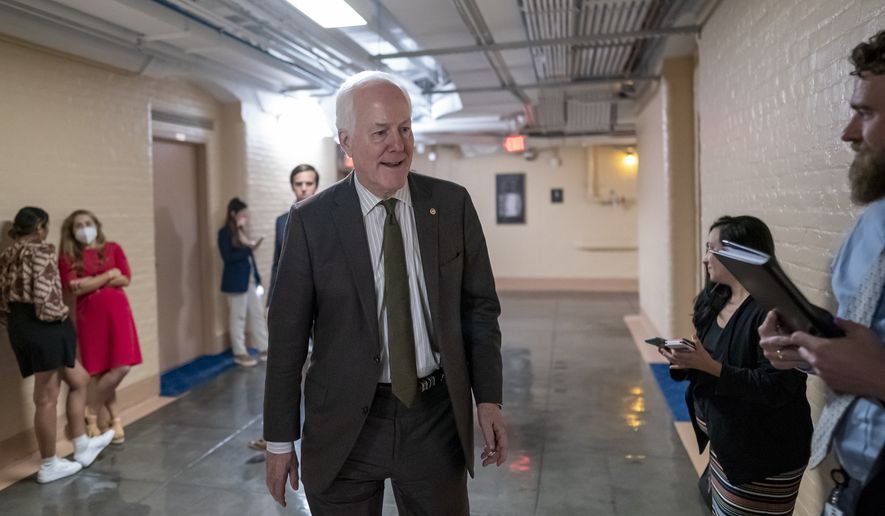Congress has reached a make-or-break point in the Senate’s bipartisan gun deal, with lawmakers warning that the nascent agreement needs to be finalized soon or risk it being derailed.
Supporters of the deal say continued delay only gives opponents, especially within the gun lobby, more time to mobilize, and risks momentum getting sapped by outside events.
“Indecision and delay jeopardize the likelihood of a bill because you can’t write what is undecided and without a bill, there is nothing to vote on,” said Sen. John Cornyn, a Texas Republican involved in the negotiations. “It’s fish or cut bait.”
Mr. Cornyn and a core group of other senators, including Democrat Christopher Murphy of Connecticut and Republican Thom Tillis of North Carolina, shocked many earlier this month by announcing a framework agreement on guns and school safety.
The deal, which has the support of more than 20 lawmakers in principle, is the most ambitious update of the nation’s gun laws in nearly a decade. It would boosts funding for school security and mental health treatment while tightening the background check system and incentivizing states to adopt “red flag” laws.
Since announcing the agreement, however, lawmakers have made little progress in drafting the legislation.
SEE ALSO: Lone gunmen outliers in nation’s mass shootings
“To land a deal like this is difficult. It comes with a lot of emotions,” said Mr. Murphy. “It comes with political risk to both sides. But we’re close enough that we should be able to get there.”
Sen. Mike Lee, Utah Republican, said Sunday he had expected to see a bill before now.
“I keep asking to see text, and it became apparent they didn’t have a bill,” Mr. Lee on “Fox News Sunday.” “In fact, they don’t have a deal at all. What they have was agreement on a series of very broad promises.”
Fault lines have emerged over the proposal’s subsidies for states to adopt red flag laws and the broadening of restrictions on gun ownership for people accused or convicted of domestic violence.
Republicans say that states that don’t adopt red flag laws should be eligible for federal funding for alternative programs such as crisis intervention or mental health programs.
Some headway has been made on that issue.
SEE ALSO: Affordable, adaptable, easy to use; firearms enthusiasts defend the reviled AR-15
“I think we’re in a better place in terms of the grants to states that have crisis intervention programs,” said Mr. Cornyn, Texas Republican. “There are other states like mine, and like Arizona that have crisis intervention programs that we want to see benefit from these federal grants as well.”
Still, negotiators are vexed about how to divvy those funds. Democrats want a larger portion for red flag laws. Republicans want the money to be divided equally.
“The ultimate goal would be to have parity,” said Mr. Tillis.
Another lingering issue is how to restrict gun ownership for people convicted or accused of domestic violence. Federal law already prohibits people from owning or purchasing guns if they have been convicted of domestic violence against a spouse or someone they lived with and with whom they have a child.
The prohibition does not apply to people convicted of domestic violence against people in other romantic relationships, such as dating but not living together.
“Everyone who’s convicted of a crime has an ability to get that expunged or set aside in state court,” said Mr. Murphy. “But you know, I’m of the view that if you beat the hell out of your dating partner and end up getting convicted for that crime, there should be consequences.”
Republicans support closing the so-called “boyfriend loophole” but are hung up on defining non-married relationships. They say domestic violence cases are usually prosecuted by state courts, which have wide latitude in defining the crime and its perpetrators.
Mr. Tillis said the deal should let the states use their one definition of “intimate partner.” Democrats want a federal definition to ensure uniformity.
“There’s pretty well-developed law around what a dating partner is already,” said Mr. Murphy. “I hope that the definition is there for the taking.”
Mr. Cornyn, whose support is vital for the deal to pass, expressed frustration that lawmakers were stuck in the weeds. He urged both sides to finalize the bill before Congress leaves for a weeklong recess on June 24.
“We’re about to run out of our rope here and we’ve got to make some final decisions … if we’re going to be able to get this on the floor next week,” he said.
Without a deal finalized before Congress leaves town, the earliest lawmakers will be able to pass the gun deal will be the second week of July.
Supporters of new gun laws fear that kicking the deal into July will allow Second Amendment to peel off GOP support or allow other issues, such as Supreme Court’s long-awaited ruling on abortion, to sideline the gun debate in Washington.
• Haris Alic can be reached at halic@washingtontimes.com.




Please read our comment policy before commenting.